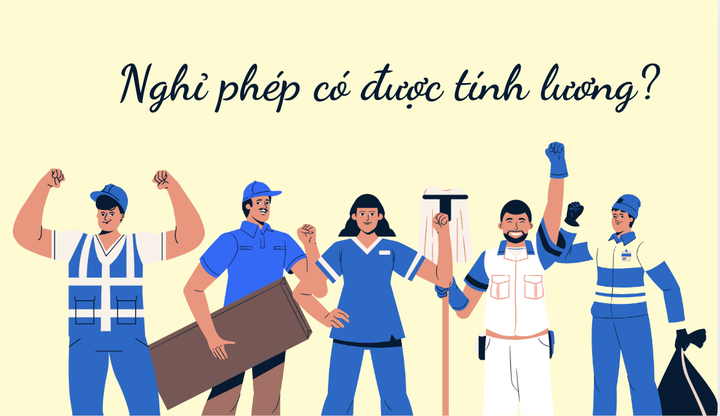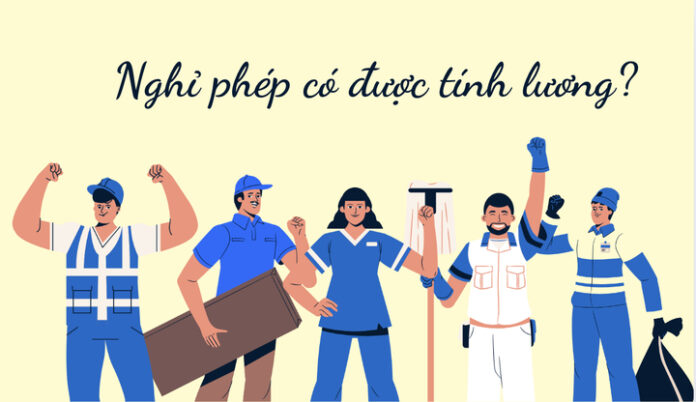Annual leave is one of the basic benefits that employees are entitled to when working for a company. However, many people wonder if they will still be paid during this time off. In addition to annual leave, are there any other circumstances where employees can take time off while still receiving their regular pay? The following information will help employees understand their legal rights and protect their interests.

A common question among employees: Is leave with pay?
Is Leave with Pay?
According to Article 113 of the 2019 Labor Code, employees who have worked for the same company for 12 consecutive months are entitled to paid annual leave. Specifically, employees working under normal conditions are entitled to 12 days of paid annual leave per year. Those engaged in heavy, hazardous, or dangerous work are entitled to 14 days, while those in especially heavy, hazardous, or dangerous work are entitled to 16 days of paid annual leave per year.
For employees who have worked for less than 12 months, the number of leave days is calculated proportionally based on the number of months worked. The formula is as follows: Number of leave days = (Number of annual leave days + number of additional leave days due to seniority, if any) / 12 x Number of months actually worked.
Importantly, during annual leave, employees are entitled to receive their full salary as specified in their labor contract. This means that if you are entitled to 12 days of annual leave, you will still be paid in full for those days.
Additionally, if an employee leaves their job or is terminated without having taken all their annual leave days, the company must provide monetary compensation for the unused leave days. Employees should be aware of this legitimate benefit and request the company to fulfill this obligation upon termination of their contract.

Employees who have worked for the same company for 12 consecutive months are entitled to paid annual leave. (Illustrative image: VNA)
Other Circumstances Where Employees Can Take Leave with Pay
In addition to annual leave, the 2019 Labor Code and Decree 145/2020/ND-CP stipulate several other circumstances where employees can take time off while still receiving their regular pay.
Public Holidays
According to Article 112 of the 2019 Labor Code, employees are entitled to paid leave on the following public holidays:
- New Year’s Day: 1 day (January 1st)
- Lunar New Year: 5 days (as specifically decided by the Prime Minister)
- Victory Day: 1 day (April 30th)
- International Labor Day: 1 day (May 1st)
- National Day: 2 days (September 2nd and 1 adjacent day)
- Hung Kings’ Commemoration Day: 1 day (10th day of the third lunar month)
Additionally, foreign employees working in Vietnam are entitled to an extra day off for their traditional New Year celebration and their National Day.
Personal Leave with Pay
According to Article 115 of the 2019 Labor Code, employees are entitled to paid personal leave in the following circumstances:
- Marriage: 3 days
- Marriage of biological or adopted child: 1 day
- Death of a parent (from either side), spouse, or biological or adopted child: 3 days
Employees taking personal leave are required to inform their employer in advance to ensure that their rights are protected and internal procedures are followed.
Leave for Treatment of Work-related Injuries or Occupational Diseases
According to Article 38 of the 2015 Law on Occupational Safety and Hygiene, employees who suffer from work-related injuries or occupational diseases are entitled to take time off for treatment without any deduction in their salary. This provision protects the rights and health of employees, especially those working in high-risk environments. During the treatment period, employees must continue to contribute to social insurance as usual.
Temporary Suspension of Work without Disciplinary Action
According to Article 128 of the 2019 Labor Code, in cases where a violation has complex circumstances, and allowing the employee to continue working would hinder the investigation, the company may temporarily suspend the employee’s work. This suspension should not exceed 15 days, or 90 days in special cases. If the employee is not subject to disciplinary action afterward, the company must pay their full salary for the period of suspension.

There are several circumstances where employees can take leave with pay. (Illustrative image: VNA)
Provisions for Female Employees
Clause 2, Article 137 of the 2019 Labor Code, and Clause 3, 4, Article 80 of Decree 145/2020/ND-CP stipulate that female employees who are pregnant are entitled to a one-hour reduction in their daily working time if their work affects their health and they have informed the company. Female employees nursing children under 12 months old are entitled to a 60-minute break during working hours.
Female employees on their period are entitled to a 30-minute break each day, for a minimum of 3 days per month. These break times are considered working hours, and employees are entitled to their full salary during this time. If a female employee does not wish to take these breaks (during their period or while nursing) and the company agrees, they will be paid additional wages for the time they choose to work instead.
In conclusion, annual leave, public holidays, personal leave, leave for the treatment of work-related injuries or occupational diseases, temporary suspension without disciplinary action, and provisions for female employees are all circumstances where employees are entitled to paid leave according to Vietnamese law. Understanding these rights helps employees protect their legitimate interests and creates transparency in the employer-employee relationship. Companies, too, should be well-versed in these regulations to ensure they fulfill their obligations to their employees, fostering a harmonious and progressive working environment.
“Consultant’s Salary for Tender Packages Can Go Up to VND 105 Million/Month”
The Ministry of Home Affairs has unveiled new regulations that could see a significant boost in remuneration for domestic consultants. Effective from July 1, 2025, the monthly salary of these professionals can reach a maximum of VND 105 million, forming the basis for determining bid package rates.
Who Can Retire at a Higher Age?
Our retirement policy has been updated to offer greater flexibility for our valued employees. If any of our staff members wish to retire earlier or pursue other ventures, we are happy to facilitate this with a comprehensive retirement package. We strive to ensure that our employees’ transitions to the next chapter of their lives are as smooth as possible, providing them with the support and benefits they deserve.













































